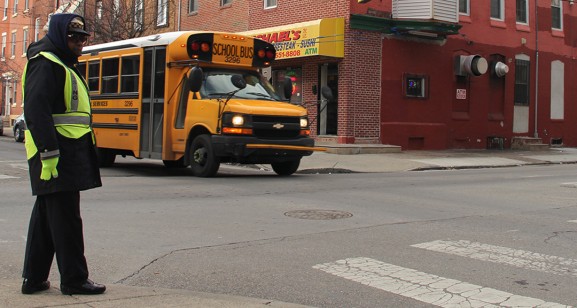
During her childhood, Mary Mills used to walk the halls of Norris S. Barratt School as a student. Now, more than three decades later, she hasn’t wandered too far.
Mills, an organizational leadership student at Eastern University in Saint David’s, PA, has been employed by the Philadelphia Police Department for the past seven years as the crossing guard of George W. Childs Elementary School on the 1500 block of Wharton Street – in the building formerly occupied by Barratt, which phased out in 2011.
In the minutes preceding and following each weekday, Mills greets students, parents and neighbors as she keeps tabs on the flow of traffic near the school. She has lived in South Philadelphia her entire life, and said the community has drastically changed since her early days in Newbold.
Although many nearby residents have chosen to leave, Mills still has a job to do. She views her crossing guard role as more than just keeping children safe on their commute to and from school. For her, it’s just as important to mentor and guide them.
How has the community here changed since those early days at Barratt?

For the past maybe decade or so there’ve been a lot of abandoned houses because of older people and people moving out of the neighborhoods, property values going down and people [are] moving out of the city. Recently, I’d say in the past 3-5 years, there’s been a lot of building – building new homes. So new, younger families are coming in. We have a lot of college students renting and moving out every few months or so. Like most inner cities, there’s been crime. There’s violence. There’s unemployment. The schools need rehabbing.
How did you get started in this position?
Most times I work, I work nights. I’m not a sleeper during the day, so I would watch the children, just watch, and I’d get to meet the different crossing guards. I said, “You know, that’s something I can do.” Plus, I wanted to go back to school and work four hours a day. Because I live so close, it was good for me. I could study in between me coming out to the corner. So, that’s one reason. And then, I like young people. I like to see how they’re growing. How they’re changing. How they’re the same. They need guidance and I talk to them.

How do you view your role as a leader within this area?
The youth, that’s my thing. Every morning I say, “Good morning.” And in afternoon when they go home, I tell them to go home, take off your uniforms, eat something, do your homework and then have a little bit of fun. But by all means read something. Read a book. Read a magazine. Read a comic book. I don’t care what it is, just as long as they read. I’d rather they read things with good messages in it, but I hope they read. … I’m not here to do what they do. I’m here to give them guidance and show them, not tell them, what they need to do.
What is your biggest frustration that comes with the job?
The drivers that think they have the right of way, even if they start halfway up the block, [and they] speed up if they see the children get right across the street. That’s very frustrating. That’s also very dangerous. And the parents that think because they walk their children to school it’s OK to cross in the middle of the street instead of bringing them to the corner, and I try to explain to them that if you teach them the right way the first time, it’s hard to un-teach a thing. You just learn it and it’s there.

Do you have a specific memory that comes to mind when you think about your position here?
Somebody has to be a first line of defense [for the children]. I’m their first line of defense before they get in there. If anything is going on before or after school, I’m going to hear it, because they’re so used to me sitting out here. Even though I am very verbal, they’re not paying me any mind, so if there’s going to be a fight in two blocks, I know this so I can tell somebody. If somebody is picking with somebody or bullying with somebody, yes, I am going to intervene. I have people tell me, “Well why you?” Because they are all our children. This is not something I just started, I’ve always been like that. I have to, you know? I think this is why God put me here.
– Text and images by Avery Maehrer and Dustin Wingate.


Be the first to comment